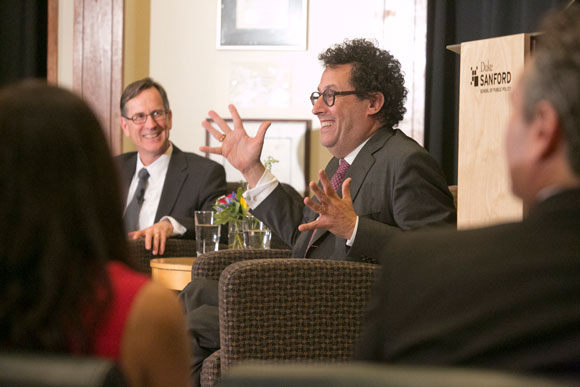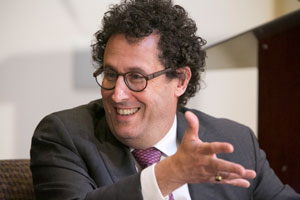
Noted writer Tony Kushner gets animated during a discussion with Professor Phil Bennett (left). Photo by Les Todd/Duke University Photography
As a college student, Pulitzer and Tony award-winning playwright Tony Kushner searched for “a way to be a theater artist and an activist,” he told the audience at the Sanford School of Public Policy on Wednesday.
Kushner, the 2015 Crown Lecturer in Ethics, engaged in a freewheeling discussion of art, politics and history with Professor Philip Bennett.
Kushner pointed to German playwright and Marxist Bertolt Brecht as his role model.
“He offered the possibility of being deeply engaged and an artist,” said Kushner. “Of course, in my 20s, I didn’t know how hard that could be.”
Kushner grew up in Louisiana during the Civil Rights era, a Jewish boy in a small town. “In some ways, I am a Southern playwright,” he said.
After his two-part play “Angels in America,” Kushner is probably best known for his work as the screenwriter for the movie “Lincoln.” Bennett asked about the ethical dilemma Lincoln faced – ending the Civil War sooner and saving lives, or pushing for the 13th amendment and abolition of slavery.

Kushner argued that Lincoln chose the path he thought could ensure the long-term survival of the nation. If slavery continued Lincoln believed, “the Civil War would be just a bloody interval before the next war, and it would be the end of the United States and of democracy,” said Kushner.
Democracy as a form of government was new and fragile in the 1800s, he pointed out. Lincoln was a genius, one of the two or three people in a century who could do things no ordinary person could, Kushner said.
“No life in U.S. history compares to Lincoln,” Kushner said.
Nevertheless, the question of slavery was resolved by Congress, even though it is “hard to imagine a less likely hero than the House of Representatives,” he said.
Bennett asked about the enduring popularity of historical drama, while pointing out that Americans today have “a deep skepticism about the ability of our political system to function.”
Present-day America is the “product of a successful democratic experience, no matter what winds are blowing, there is a kind of democratic instinct in our society,” Kushner said.
Kushner sees parallels between the Congress during Lincoln’s time and today’s Congress, in gridlock and contempt for the federal government. However, he said, “Lincoln had the advantage of the empty desk of the people who seceded. Can you image how much easier it would be for Obama if Mitch McConnell seceded?”
Bennett then asked about Obama’s handling of the issue of gay marriage, which has garnered criticism from the LGBTQ community.
Obama was pragmatic, Kushner said. He couldn’t come out strongly for gay marriage in the 2008 campaign and expect to win the election.
“He was Lincolnian in his ability to gauge what the nation could hear and when it could hear it,” Kushner said.
Kushner hopes the Supreme Court will rule in favor of gay marriage, as it is clear that there needs to be one federal ruling on the issue for consistency across the country.
Kushner also discussed his current projects, including a screenplay for a movie about Congresswoman Barbara Jordan to star Viola Davis, an HBO miniseries, and a musical about Eugene O’Neill, because, joked Kushner, “as a Freudian, it’s time to kill Daddy.”
He just finished a screenplay for Steven Spielberg based on the book, “The Kidnapping of Edgardo Mortara,” by David Kertzer, a true story about a Jewish boy secretly baptized and then taken from his family by the Catholic Church. The incident eventually led to the end of the Vatican rule of Italy and Italy's transformation into a modern state.
During the question and answer session with the audience, Kushner responded to questions about the use of the Holocaust, his artistic choices in the screenplay of “Munich,” and how race and ethnicity affected his work.
He answered with stories from his growing up in Louisiana, including his first venture into activism – handing out leaflets for George McGovern at a Ku Klux Klan rally. His high school was integrated through busing and his high school debate team was fully integrated. The predicted race riots didn’t happen.
“For a little while, that bit of social engineering worked,” he said. “It gave us a momentary glimpse of what, with sufficient political will, this country could be.”